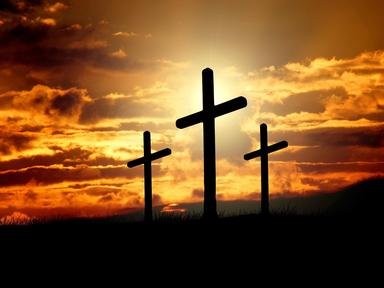Quiz Answer Key and Fun Facts
1. This early evangelical minister, who was born in about 1494, was strangled to death and afterward his dead body was burned at the stake. He had to travel to Germany to learn the Hebrew language, because of England's expulsion of the Jews, and he was extremely instrumental in authoring the forerunner of what is today called the 1611 version of the King James Bible.
Who was this man, and why was he executed on October 6, 1536?
2. Dwight Lyman (D.L.) Moody was one of nine children, and was born on February 5, 1837. His father died when Dwight was only four years old. After he grew up and left Massachusetts and began his preaching career, what event led to the destruction of his first church?
3. Jonathan Edwards was born in Connecticut on October 5, 1703, and entered Yale college just before reaching the age of 13. Like many members of his family, he was highly educated, with a rich background in the study of many different disciplines; natural sciences, atomic theory, and philosophy, and he still managed to graduate at the head of his class!
Now, can you tell me what the title of his most famous sermon was?
4. William Ashley (Billy) Sunday, (November 19, 1862 - November 6, 1935), was a former baseball player who later in life became an evangelist. What was his REAL last name, before his family had it changed from its Germanic roots?
5. "The Pilgrim's Progress" was a book written by a man born in England in 1628, just a mere 17 years after the introduction of the King James Version of the Bible in 1611. Who authored this allegorical tale that featured a main character named "Christian"?
6. John Wesley was born in Epworth, England on June 17, 1703, and was the fifteenth of nineteen children. He later married a woman who was the twenty-fifth child of her family! After receiving his deaconship at Christ Church College, Oxford, he, his brother Charles, and a friend, George Whitefield, were branded as "Methodist" by students at Oxford who made fun of the methodical way in which they ordered their lives. In which U.S. city did he establish the Methodist movement prior to returning to England?
7. Frances Jane (Fanny J.) Crosby, born in New York in 1820, was a songwriter who became a household name. She was a well-known writer of Protestant hymns and wrote over 8,000 of them in her lifetime. What makes this even more remarkable is the fact that she suffered from what most people would consider a debilitating problem that would make such a feat almost impossible. What type of affliction did she have to contend with?
8. The English minister, Charles Spurgeon, was converted to Christianity in a Primitive Methodist church in the middle of a snowstorm in 1860. With what Christian denomination did he later become affiliated?
9. What English Methodist minister found out early in life that he had a passion and talent for acting in the theatre, which he later used to advantage in the retelling of Bible stories in his sermons?
10. This evangelist, slightly more recent than those of the Great Awakening period, was born on November 7, 1918, and grew up on his family's dairy farm near Charlotte, North Carolina. He first graduated from Florida Bible Institute (now Trinity College) and subsequently graduated with a B.A. from Wheaton College in Wheaton, Illinois, later marrying one of his classmates.
Who was this evangelist, whose wife's name was Ruth?
Source: Author
logcrawler
This quiz was reviewed by FunTrivia editor
CellarDoor before going online.
Any errors found in FunTrivia content are routinely corrected through our feedback system.
